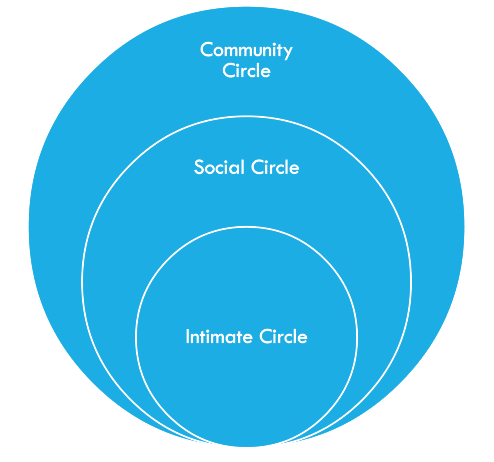Life for our ancestors on the savannah 80,000 years or so ago would have been harsh and matters of life-and-death a daily consternation. Anthropologists point out that our existence today was largely because our ancient relatives had the capacity to cooperate. They lived in small hunter-gather groups fending off attacks from sabretooth tigers through combined efforts and gathering food and making shelter as a collective. Their ability to survive was predicated on the web of social connections that wrapped around them. Now imagine for a moment, you are a part of one of these ancient human groups, a tribe or clan, and you are suddenly separated from, or worse, ‘kicked-out’ of the group. Consider how lonely, devastating, and petrifying it might have been to realize you were alone, and had to fend for yourself. For our ancestors, to find themselves in such circumstances without their tribe would have been incredibly dire! Their chances of survival were grim. We could surmise that in such a situation our efforts would have been to seek out our group, or quickly find another, or otherwise perish. We mostly forget that this heritage runs thick through our veins still. We are who we are today as a species thanks to the cooperative spirit of our human nature. Sometimes we will find ourselves in our modern age alone on the savannah feeling all is lost. And in those times, when we are confronted with circumstances that seem to threaten our ability to survive, we need to connect with our tribe; our family and our mates.

Social scientists are finding that our sense of social connection and community today is in free fall, and rates of loneliness are almost epidemic. Certainly, the COVID-19 pandemic only worsened this, but also, paradoxically brought the problem of our declining social lives into the light. In recent decades it seems that adults have lost the ability to connect and socialize with our tribe. This is especially true for dads, with research showing that men in the age of 35 to 50 are surprisingly one of the loneliest groups in Australian society. And we are certainly worse off for it. Human beings suffer more in their isolation. Rates of depression and anxiety sored in the years between 2020 and 2022.
Our relationships with others can affect our mental health, particularly when those relationships are an important part of how we see ourselves, often referred to as our self-concept. It says that not all relationships are the same when it comes to our mental well-being. Instead, they suggest that we often view the world and our social interactions based on how we see ourselves in relation to others. This means that we don't just define ourselves by our unique qualities but also by what we share in common with others. Certain relationships, when they play a big role in shaping how we see ourselves, can have a strong impact on our mental health. So, it's not just any relationship that has this effect, but those relationships that are closely tied to our sense of who we are as a group or as individuals. The way we see ourselves in relation to others in our social circles can significantly affect our mental health. Remarkably, social connection can be a powerful remedy for depression and anxiety, and more so, can help us to thrive in our lives.
In a large study, researchers looked at how joining social groups affects people's mental health, especially when it comes to depression. They studied a group of English people over 50 years old and considered factors like age, gender, job status, relationships, and health. What they found was that joining social groups, like clubs or associations, reduced the chances of someone getting depressed, especially if they had a history of depression. For example, joining one group decreased the risk of depression returning from 41% to 31%, and joining three groups reduced the risk to only 15%. This supports the idea that being part of groups can be really good for mental health. The study also suggests that having more social identities (feeling like you belong to different groups) can give you more psychological strength and help your health even more. So, having a range of social connections can be even better for your well-being.
But it's not just being a member of a group that matters; it's also how much you identify with that group. For example, simply having a gym membership doesn't mean you identify strongly as a gym-goer. It's the strong identification with a group that seems to protect against depression. Some research even shows that feeling connected to family, coworkers, or other groups is more important for mental health than just how much time you spend with them.

In a nutshell, being part of social groups and identifying strongly with them can help prevent depression and improve mental well-being. The more of these connections you have, the better it tends to be for your mental health. Coming back to whatever struggle or crisis you may be currently enduring, social connection and sharing your worries with others who care for you can be a soothing balm. That said, many find it difficult to talk about their emotional reactions to life’s disasters. Perhaps it is shame, embarrassment, or the stigma that still surrounds mental health. However, I am not necessarily suggesting that opening up and sharing our pain with others is always the best first option. Sometimes opening up to others is hard, especially when you are socially withdrawn and feeling isolated. That may come with greater comfort down the track. An easy initial step is to just consider who is available in your immediate circle of friends and family that you can just be with. And I mean be with! Not online, but physically with. You see, being amongst our tribe, our friends and family, can on its own help us to feel a sense of strength and safety, much like when our ancestors sat around a fire at night. So if you find yourself feeling alone, facing a world of hurt, find that camp fire and just sit. Be there. If there is comfort to share your life with someone who you feel close to, then of course do that. There is something known about how different we feel when we share our pain (and joy) with our network. As the old saying goes, ‘a problem shared is a problem halved’.
So, how can you improve your social-connection?
A common activity I conduct in therapy sessions with men overcoming depression is to conduct an audit of their interpersonal and social lives, to see “who is who” in their own zoo. I would encourage you to take the time now and do the same. On a blank piece of paper draw three circles – intimate, social and community. Like this -
For each of the circles ask yourself the following questions, writing down the specific names and details in each of the circles;
Intimate Circle:
Who are the important people in your life?
Who supports you ?
Who confides in you?
Who do you talk to most days?
Social Circle:
Who do you catch up with for social gatherings?
Who do you go out with for drinks or a coffee?
Who do you meet up with to watch a sporting match?
Community Circle:
What community organisations are you a part of? (Sport Clubs/Volunteer Groups)
What groups do you support of contribute to?
What organisations do you feel support from? (Clubs/Church etc)
Now take a moment and reflect on what you see in this diagram. Think of it as a map of your social connectedness. What does it tell you? Often it highlights some gaps, or a lack of connections. Sometimes you may note that peoples’ names are written in one of the circles that you haven’t heard from in a while. Maybe you might reflect on how this diagram looks and think about it in comparison to other periods of life and how you might have filled it in differently. However it looks now, this becomes a useful tool to start planning some action on improving your social connectedness. One way of approaching this is to think of things that you like doing, and then ask yourself, “who can I do that with”? Then make the call, reach out and begin to reconnect. Pick one area of your life, let’s say your social circle, and make a plan to address one aspect. For example, you might notice that you have a few friends in your social circle that you enjoy engaging in a particular activity, like cycling. Now, make a call, send a message, and start the process of reconnecting. Take a trial-and error approach, give something an opportunity at least once and see how it works out.
Bibliography:
Baker, N. (July 15, 2023). Middle-aged men are among the loneliest in Australia. What could help to change that? https://www.abc.net.au/news/2023-07-14/middle-aged-men-experiencing-high-level-loneliness/102563492
Hari, J. (2018). Lost connections: Uncovering the real causes of depression–and the unexpected solutions. Bloomsbury Publishing.
Haslam, C., Cruwys, T., Haslam, S. A., Dingle, G., & Chang, M. X. L. (2018). The new psychology of health: Unlocking the social cure. Routledge.
Haslam, C., Cruwys, T., Haslam, S. A., Dingle, G., & Chang, M. X. L. (2016). Groups 4 Health: Evidence that a social-identity intervention that builds and strengthens social group membership improves mental health. Journal of Affective Disorders, 194, 188-195. https://doi.org/10.1016/j.jad.2016.01.010
Stuart, S. (2008). Interpersonal psychotherapy: A clinician's guide. CRC Press.



